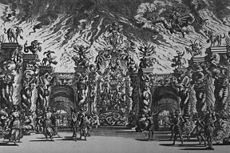- Antonio Cesti
-
Antonio Cesti (Italian pronunciation: [anˈtɔːnjo ˈtʃesti]) (bap. 5 August 1623 – 14 October 1669), known today primarily as an Italian composer of the Baroque era, he was also a singer (tenor), and organist. He was "the most celebrated Italian musician of his generation".[1]
Contents
Biography
He was born at Arezzo, and studied with various local musicians. In 1637 he joined the Franciscan order. While he was in Volterra he turned more toward secular music, probably due to the patronage of the powerful Medici family. Here he also came in contact with Salvator Rosa, who wrote librettos for a number of Cesti's cantatas. By 1650 Cesti's calling as a monk and his success as a singer and composer for operas was coming into conflict, and he was officially reprimanded. In 1652 he became a member of the court at Innsbruck of Ferdinand Charles, Archduke of Austria. After holding a post somewhere in Florence as maestro di cappella, he entered the papal chapel in 1660. In 1666 he became Vice-Kapellmeister at Vienna, and died at Venice in 1669.
Music
 Scenography for Il pomo d'oro
Scenography for Il pomo d'oro
Cesti is known principally as a composer of operas. The most celebrated of these were La Dori (Venice, 1663), Il pomo d'oro (Vienna, 1668) and Orontea (1656). Il pomo d'oro (The Golden Apple) was performed for the wedding of Emperor Leopold I. It was far more elaborate than contemporary Venetian operas, including a large orchestra, numerous choruses, and various mechanical devices used to stage things like gods descending from heaven (deus ex machina), naval battles, and storms. Orontea was revived seventeen times in the next thirty years, making it one of the most frequently performed operas on the continent in the mid-17th century. Even Samuel Pepys owned a copy of the score.
Cesti was also a composer of chamber cantatas, and his operas are notable for the pure and delicate style of their airs, more suited to the chamber than to the stage. He wrote in the bel canto style of the 17th century, and his compositions were heavily influenced by his career as a professional singer. Cesti's musical writing owes much to the emerging tonality of the time.
Works
Title Libretto Première date Place, theatre Notes Alessandro vincitor di se stesso Francesco Sbarra 1651 Venice, Teatro Santi Giovanni e Paolo Il Cesare amante Dario Varotari 1651 Venice, Teatro Grimano Cleopatra Dario Varotari 1654 Innsbruck revised version of Il Cesare amante L'Argia Giovanni Filippo Apolloni 1655 Innsbruck Marte placata Giovanni Filippo Apolloni 1655 Innsbruck Orontea Giacinto Andrea Cicognini, revised by Giovanni Filippo Apolloni 19 February 1656 Innsbruck La Dori Giovanni Filippo Apolloni 1657 Innsbruck Venere cacciatrice Francesco Sbarra 1659 Innsbruck lost La magnanimità d’Alessandro Francesco Sbarra 1662 Innsbruck Il Tito Nicolò Beregan 13 February 1666 Venice, Teatro Grimano Nettuno e Flora festeggianti Francesco Sbarra 12 July 1666 Vienna Le disgrazie d'Amore Francesco Sbarra 19 February 1667 Vienna La Semirami Giovanni Andrea Moniglia 9 July 1667 Vienna revised 1674 in Modena as La schiava fortunata La Germania esultante Francesco Sbarra 1667 Vienna Il pomo d'oro Francesco Sbarra 12–14 July 1668 Vienna Genserico Nicolò Beregan 1669 Venice Recordings
- Pietro Antonio Cesti "Pasticcio", Festwochen der Alten Musik in Innsbruck 1980, excerpts from operas "Il pomo d'oro", "Argia", "Tito", "Orontea", "Dori", "Semirami". Performers: Rene Jacobs, Judith Nelson, William Christie, Konrad Junghänel. ORF Edition Alte Musik.
- Le disgrazie d’amore, Auser Musici, Carlo Ipata, director, Hyperion CDA67771 (2010)
See also
- Baroque opera
- Francesco Cavalli
- Claudio Monteverdi, a contemporary of Cesti
References
- ^ "?". http://www.grovemusic.com. Retrieved 23 August 2010.
 This article incorporates text from a publication now in the public domain: Chisholm, Hugh, ed (1911). Encyclopædia Britannica (11th ed.). Cambridge University Press.
This article incorporates text from a publication now in the public domain: Chisholm, Hugh, ed (1911). Encyclopædia Britannica (11th ed.). Cambridge University Press.- David L. Burrows. "Antonio Cesti", Grove Music Online, ed. L. Macy (accessed December 29, 2005), grovemusic.com (subscription access).
- Grout, Donald; Claude Palisca. A History of Western Music, 6th edition. W. W. Norton & Company. New York, 2001.
External links
Categories:- 1623 births
- 1669 deaths
- People from Arezzo
- Italian composers
- Baroque composers
- Opera composers
Wikimedia Foundation. 2010.
